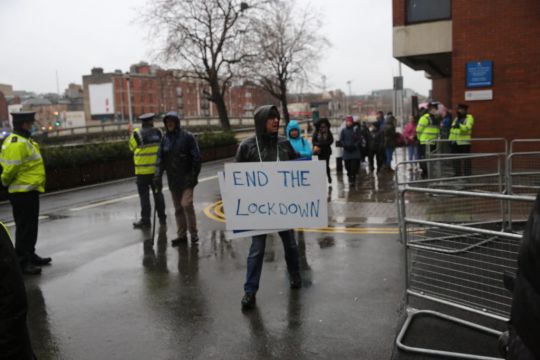An appeal by Gemma O’Doherty and John Waters against a refusal to permit them to challenge the constitutionality of laws introduced by the State due to the Covid-19 pandemic has opened before the Court of Appeal.
Ms O'Doherty in her opening remarks to the Appeal Court described the restrictions introduced to counter the virus she said was the "common cold" as being "barbaric".
There was a heavy Garda presence at the Four Courts as supporters of Ms O'Doherty and Mr Waters protested outside the courts complex over not being permitted to attend the hearing.
The appeal is against the High Court’s refusal to permit the two to bring their challenge and its award of costs of that hearing against them.
The appeal, which is opposed by the State, is before the President of the Court of Appeal Mr Justice George Birmingham, Ms Justice John Edwards and Ms Justice Caroline Costello.
High Court ruling
Ms O’Doherty, and Mr Waters claim the High Court's decision refusing them permission to bring their challenge against the laws.
Mr Waters submitted the appeal court should set aside the High Court judgment on the matter which he claimed was "deeply tainted."
The number attending the proceedings has been limited due to the Covid-19 restrictions.
While the applicants are physically in the courtroom the three judges and lawyers for the State respondents are attending via video link.
In judicial review proceedings against the State and the Minister for Health, with the Dáil, Seanad and Ceann Comhairle as notice parties, the appellants had sought to have various legislative measures declared unconstitutional and flawed.
Constitution
Earlier this year Ms O'Doherty and Mr Waters, who represented themselves, sought to challenge legislation including the 2020 Health Preservation and Protection and Other Emergency Measures in the Public Interest Act; the 2020 Emergency Measures in the Public Interest Act Covid-19 Act and the 1947 Health Act (Affected Areas) Order.
They claimed the laws, and the manner in which they were enacted, are repugnant to several articles of the Constitution including concerning the rights to travel, bodily integrity and the family, and amounted to an “unprecedented suspension” of constitutional rights.
In his judgment last May refusing leave for judicial review, Mr Justice Charles Meenan said their claims were not arguable and they had not provided any expert evidence or facts to support their view the laws were disproportionate or unconstitutional.
The applicants, who had "no medical or scientific qualifications or expertise”, had “relied on their own unsubstantiated views, gave speeches, engaged in empty rhetoric and sought to draw parallels to Nazi Germany which is both absurd and offensive."
The manner in which the Houses of the Oireachtas dealt with the laws, introduced by a caretaker government and voted on by an incoming Dail and outgoing Seanad, was not something a court could interfere with, he said.
The laws are constitutionally permissible, he held.
The proceedings should have been brought via plenary hearing, involving hearing oral evidence, and not judicial review, he also held.
The hearing of the appeal continues.







